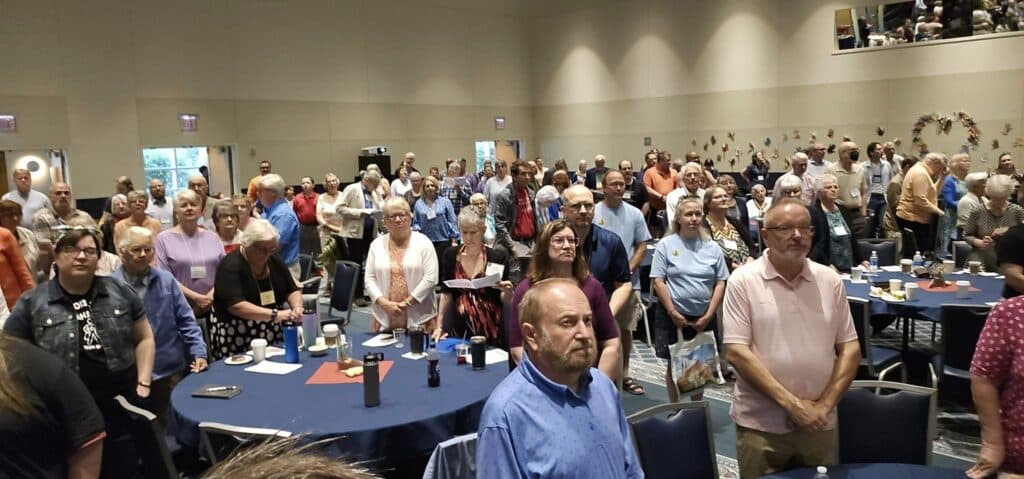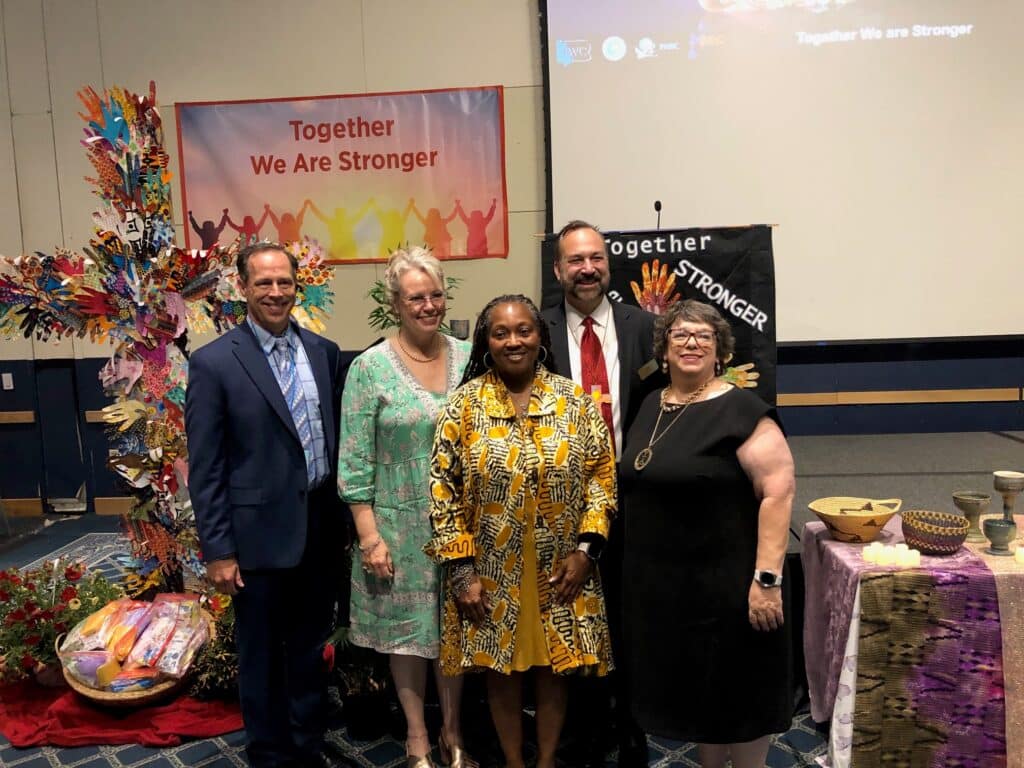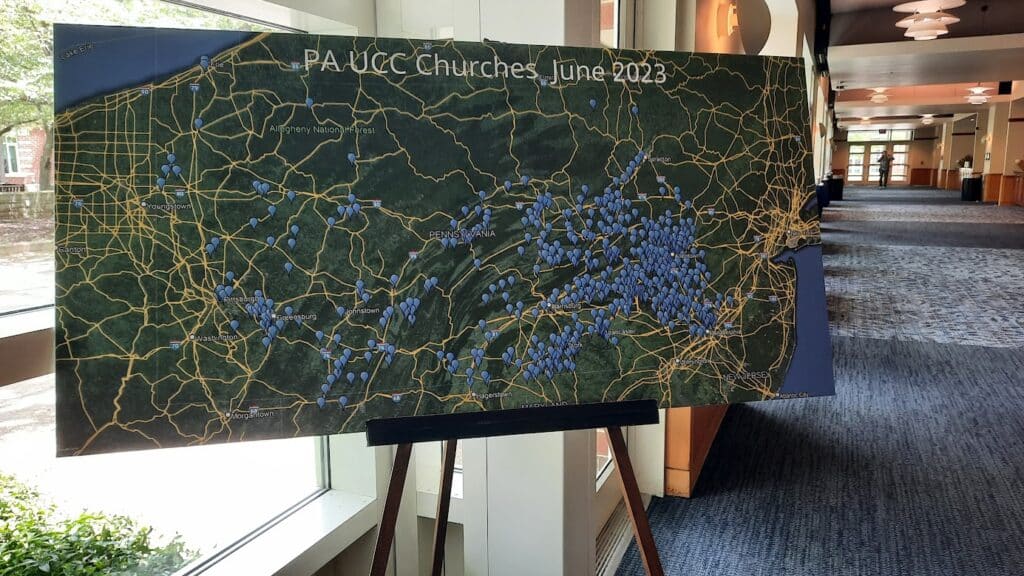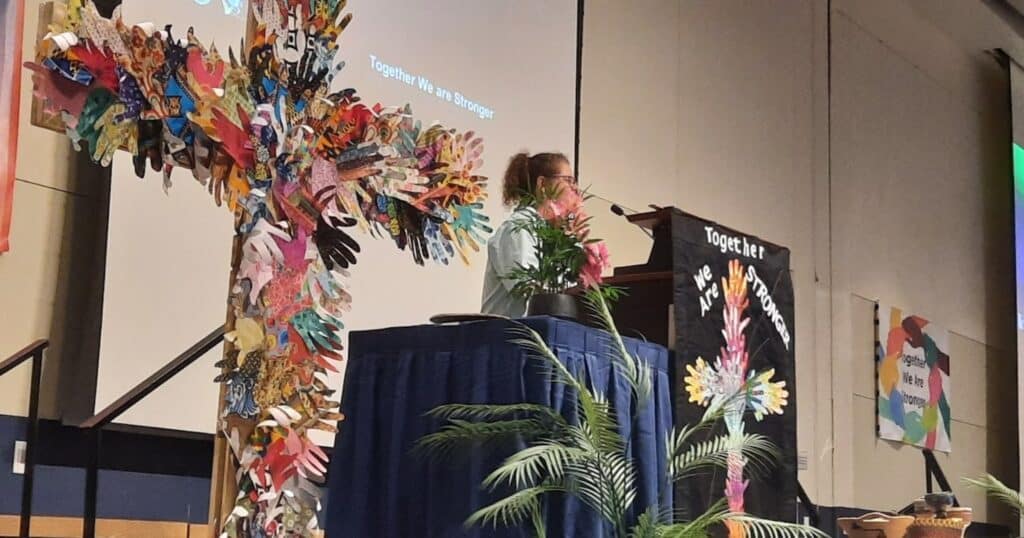UCC Conferences in Pennsylvania make moves toward new Keystone Conference
Earlier this year, the four United Church of Christ conferences in Pennsylvania gathered for their first shared annual meetings. It was one step toward the possibility of forming a new, combined conference from the Penn West, Penn Central, Pennsylvania Southeast, and Penn Northeast Conferences.
The theme – “Together we are stronger” – was echoed throughout the visual displays and collective worship at their June 7-9 joint gathering in State College, Pennsylvania.
“It was one the most amazing experiences I’ve had in the course of my life in ministry,” said the Rev. David Ackerman, Penn West Conference minister. “It was a tremendous experience – the energy, the Spirit was present. Whether the Keystone vote in November is affirmative or not, we’ll always have that.”
The gathering of 436 people in-person and 140 online delved into the details of a proposed Keystone conference – items like governance, staffing, and finance – and collected feedback from attendees, which will be further addressed in town hall-style meetings in the fall.

“What I heard from folks is that they felt connection in ways that they hadn’t felt across the conferences in the past. There was energy and hope,” said the Rev. Bonnie Bates, conference minister of Penn Northeast.
The official motion that proposes dissolving the current four conferences and creating a new, combined Keystone Conference will be voted on by delegates at each respective conference’s gathering in November.
If the motion passes in all four conferences, it will be presented as a resolution to the Governance Committee of the UCC Board of Directors for a delegate vote at the 2025 General Synod in Kansas City.
‘Fresh expressions of faith’
Ideas for a “Keystone” Conference – the name a reference to Pennsylvania’s state nickname – have been about two years in the making.
It originated with conversation between the conference ministers, who established a study group in October of 2022. This quickly became the Keystone Working Group, consisting of five representatives from each conference who have met regularly since.
“We were all looking at ways to optimize the resources we had and to help our congregations feel better supported and more connected in a time when donations were going down in some places and the church really needs a strong voice,” Bates said.

The Keystone resolution describes how “these current times require fresh expressions of faith, rituals, discipleship, and leadership.”
“We believe that if we are to encourage and transform the church we know, we must transform ourselves and the denominational structures and expectations we have of them and each other,” it states.
The four Pennsylvania conferences have significantly declined in the number of churches, pastors, and funds since their beginnings – factors that the working group believe can be better met by sharing and combining resources. Conference leaders have also witnessed the 2019 establishment of the Southern New England Conference, created when General Synod approved the dissolution of Connecticut, Massachusetts, and Rhode Island Conferences to form the new conference.
“We were talking to our churches about now being the time for shared ministry and realized we need to be talking about this at the conference level too,” said the Rev. Carrie Call, Penn Central Conference minister.
While the working group initially considered several different forms for sharing resources, they overwhelmingly opted for fully combining the conferences as the best way to serve congregations, conferences, and pastors, Bates said.

‘Together we are stronger’
Given that each conference has its unique attributes and offerings, each could experience different impacts in merging into one.
For instance, the Rev. William Worley, Pennsylvania Southeast Conference minister, described how he can travel anywhere within his conference within an hour and a half, and with the proposal of a statewide geographical area, he has heard fears about losing a sense of intimacy. Others have expressed worries about the mostly small churches that make up each conference getting lost in the mix. And questions have arisen around what shared identity means when churches embody a wide range of perspectives.
And yet, surveys conducted by the working group on topics like theological perspectives, connection to the broader UCC, and how pastors relate to their congregations have revealed that the four conferences are more similar than they are different, according to Bates.
As each conference anticipates its upcoming vote in November, the joint annual meeting offered a glimpse of how a Keystone Conference could offer new opportunities.
“The connections that occurred at our joint meeting demonstrated that bringing worship resources, workshop resources, question and answer resources, and gathering people together, we really were stronger than we could have been alone,” said Bates. “We really are committed to the ‘together we are stronger’ vision of who we can be.”
Content on ucc.org is copyrighted by the National Setting of the United Church of Christ and may be only shared according to the guidelines outlined here.
Related News
A Moment of Silence
The weekend news was alarming. Two students shot and killed with 9 injured at Brown University...
Read MoreIn hope-filled worship service, UCC and United Church of Canada celebrate full communion past and future
On Saturday, Dec. 13, many from the United Church of Christ (UCC) and the United Church of...
Read More‘A Gift of God to the World:’ Christmas greetings from the General Minister and President
As Christmas quickly approaches, UCC General Minister and President/CEO the Rev. Karen Georgia...
Read More


